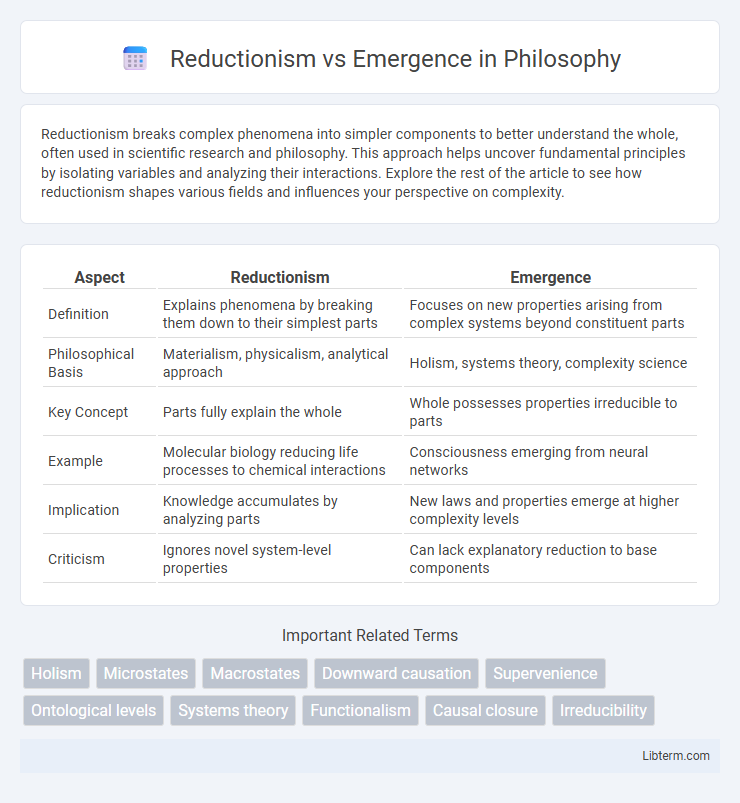Reductionism breaks complex phenomena into simpler components to better understand the whole, often used in scientific research and philosophy. This approach helps uncover fundamental principles by isolating variables and analyzing their interactions. Explore the rest of the article to see how reductionism shapes various fields and influences your perspective on complexity.
Table of Comparison
| Aspect | Reductionism | Emergence |
|---|---|---|
| Definition | Explains phenomena by breaking them down to their simplest parts | Focuses on new properties arising from complex systems beyond constituent parts |
| Philosophical Basis | Materialism, physicalism, analytical approach | Holism, systems theory, complexity science |
| Key Concept | Parts fully explain the whole | Whole possesses properties irreducible to parts |
| Example | Molecular biology reducing life processes to chemical interactions | Consciousness emerging from neural networks |
| Implication | Knowledge accumulates by analyzing parts | New laws and properties emerge at higher complexity levels |
| Criticism | Ignores novel system-level properties | Can lack explanatory reduction to base components |
Defining Reductionism: A Foundational Perspective
Reductionism defines complex systems by breaking them down into their most basic, fundamental components, positing that understanding these parts fully explains the whole. This foundational perspective supports the idea that all phenomena can be analyzed through lower-level elements, such as atoms in physics or neurons in neuroscience. Scientific disciplines like molecular biology and classical physics heavily rely on reductionist methods to uncover underlying mechanisms.
Understanding Emergence: Beyond the Sum of Parts
Emergence describes complex phenomena arising from simple interactions within a system, where the whole exhibits properties not predictable from its individual components. This concept challenges reductionism, which attempts to understand systems solely by analyzing their parts in isolation. Studying emergence requires interdisciplinary approaches that integrate system dynamics, nonlinear interactions, and collective behavior to reveal novel insights beyond traditional reductionist frameworks.
Historical Roots and Philosophical Background
Reductionism, originating in the scientific revolution of the 17th century with figures like Rene Descartes and Isaac Newton, views complex systems as the sum of their parts, emphasizing analysis by breaking down phenomena into fundamental components. Emergence, rooted in 19th and 20th-century philosophy and systems theory, challenges this by asserting that complex properties arise from the interactions and organization of parts, not predictable from individual components alone. Philosophers such as Aristotle initially hinted at emergent properties, while modern thinkers like C.D. Broad and John Stuart Mill developed these ideas further within metaphysics and epistemology.
Key Differences Between Reductionism and Emergence
Reductionism explains complex phenomena by breaking them down into their simplest components, emphasizing individual parts and their fundamental interactions. Emergence highlights how complex systems exhibit properties and behaviors that cannot be fully understood solely from knowledge of their components, stressing system-level interactions. Key differences include reductionism's focus on bottom-up explanations, whereas emergence relies on top-down processes and holistic understanding.
Real-World Examples: Biology, Physics, and More
Reductionism explains complex biological structures by analyzing individual molecules and genes, such as understanding DNA sequences to comprehend genetic diseases. Emergence highlights phenomena like consciousness arising from neuronal networks or the collective behavior of particles producing superconductivity in physics. Ecosystem dynamics exemplify emergence, where interactions between species and environments create patterns that cannot be predicted by examining individual organisms alone.
Implications for Scientific Inquiry
Reductionism dissects complex systems into constituent parts to understand fundamental mechanisms, facilitating detailed molecular or atomic-level analysis in scientific inquiry. Emergence emphasizes properties and behaviors arising from interactions within systems that cannot be predicted solely by examining individual components, challenging purely reductionist approaches. Considering both perspectives enriches scientific investigation by integrating micro-level explanations with macro-level phenomena, enhancing the capacity to explain complex biological, physical, and social systems.
Critiques and Limitations of Reductionism
Reductionism faces critiques for oversimplifying complex systems by isolating components and ignoring the interactions that give rise to novel properties. It often fails to account for emergent phenomena where higher-level behaviors cannot be predicted solely from individual parts. Limitations of reductionism include its inability to fully explain consciousness, social dynamics, and biological complexity due to the disregard of contextual and systemic influences.
The Strengths and Challenges of Emergentism
Emergentism excels in explaining complex systems by highlighting how novel properties arise from the interactions of simpler components, which reductionism often overlooks. This approach captures phenomena such as consciousness and ecosystem dynamics by emphasizing holistic patterns and interdependencies. However, emergentism faces challenges in providing precise predictive models and in defining clear causal mechanisms for emergent properties within scientific frameworks.
Interdisciplinary Approaches: Integrating Both Views
Interdisciplinary approaches to reductionism and emergence emphasize synthesizing detailed component analysis with holistic system behavior to capture complex phenomena accurately. Integrating molecular biology, cognitive science, and systems theory allows researchers to link micro-level interactions with macro-level patterns, enhancing explanatory power. This integration supports innovation in fields like artificial intelligence and ecology by bridging mechanistic insights and emergent properties.
Future Directions in the Debate: Reductionism vs Emergence
Future directions in the debate between reductionism and emergence center on integrating complex systems theory with advances in quantum mechanics and neural networks to transcend traditional explanatory models. Emerging interdisciplinary research emphasizes the development of hybrid frameworks that capture both micro-level causal mechanisms and macro-level emergent phenomena, facilitating a more comprehensive understanding of cognition, biology, and social dynamics. Cutting-edge computational simulations and empirical methodologies aim to quantify emergence, potentially bridging gaps between reductionist precision and holistic systemic properties in scientific inquiry.
Reductionism Infographic

 libterm.com
libterm.com